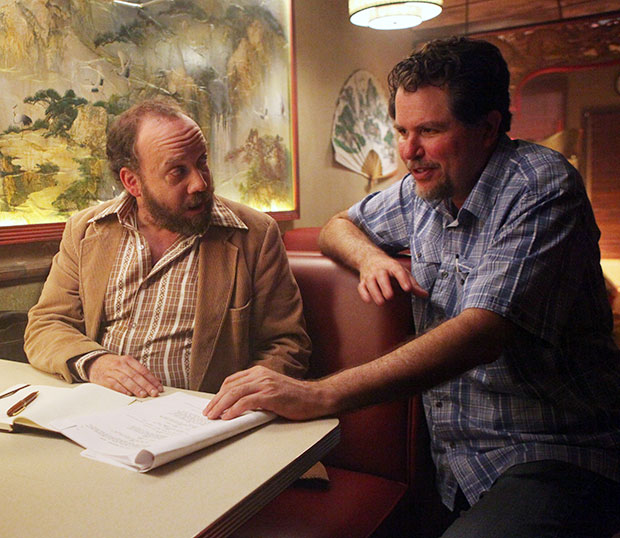
It’s hard to define, let alone predict or try and control, what makes a “cult movie.” A good few directors have a knack for the construction of the rare, beloved entity — Don Coscarelli, the man who has delivered the Phantasm series, Beastmaster, and the more recent triumph Bubba Ho-Tep, certainly seems to have the secret formula on file. Coscarelli’s latest cinematic venture, one
with no deficit of the weird in which he has stuffed each of his previous films, is John Dies at the End.
As a screen adaptation of the horror comedy novel by David Wong, Coscarelli’s odd vision of the even odder story might well vie for a cult status of its own. And whether the denotation pertains to his movies or otherwise, Coscarelli admits an unbridled fondness for the growth of the phenomenon that is a cult movie, and for the people who celebrate them so passionately. In our below interview with Coscarelli, the filmmaker discusses his latest unusual project, the challenges in transforming such peculiar material to screen, and what he sees in the future of cult movies in general.
The idea of “stranger” movies is clearly not anything new to you. Is that what drew you to this? Knowing the nature of the book and how bizarre and offbeat it was?
Absolutely. I’m a great fan of things that are different. This book came to be, basically, in an e-mail from Amazon.com. I read this zombie fiction book, and it said, “If you like this zombie fiction book, you’ll love John Dies at the End. That they’re able to actually, using their algorithms, figure out what people like… So I guess they knew what I liked and sent me that book. I always had an interest in “What is reality?” And I think I have a good sense of humor, and the film and the book have a pretty wild and wacky sense of humor.
When you were turning this book into a movie, and you had all this strange stuff to draw from, was there anything that you felt like you couldn’t put in? Anything that was too weird? Maybe you had pushback, or just didn’t think it would be accessible?
Oh yeah. There were a number of items in there that didn’t work. Some of them had to do with scale. There were ideas that would have really challenged James Cameron to pull off — requiring huge and epic effects, and what have you. So those were not possible. There were a few tonal things that were maybe a little too out there for a movie. They had scatological things and references that just got way too weird, that I took out. Generally, I stayed as true as I could to the book, because I thought it was brilliant. And I thought that this writer, David Wong in particular, definitely had a feel and a voice for his generation.
Speaking of David Wong’s voice, when you do adapt a book to a movie — you said you stayed pretty faithful, but I’m sure you want to inject your own voice. Especially with a story where the character is actually named after the author, is there influence to stray toward his voice as opposed to your own? Or did you find that the two melded well?
I think just by the nature of making a movie — screenwriting and directing and editing —my voice and my tastes come through loud and clear, just by doing those things. I had a good experience with the other adaptation that I did, Bubba Ho Tep. With that one, I treated the author’s work almost like the Bible, in that if we ever had a question, I’d come back to the source novel. If you’re going to embark on the insanely huge amount of work involved in making a movie like this, you’ve got to step into it what’s phased in the source material. I think it would be kind of odd to take it and only use a few different pieces of it.
What about visually? There’s a lot of room, when you’re turning something literary into a visual medium, for your own interpretation. How did you decide what the monsters and creatures would look like? Were there ideas that you had to scrap there?
Certainly, form follows function. I was always grasping around at times, trying to figure out how we would realize some of these effects. Because it was so ambitious. One of the breakthroughs was the major monster in the movie that we refer to as the “meat monster.” And for a while, I thought that the only way I could pull something like that off was digitally. But I was working with a really talented illustrator, and one of his drawings came back. And for the first time, I could see that it could be done as a man in a suit. And that was so much more comfortable for me to be able to have something tangible that the actors could really work with. Luckily, having been around the horror block a few times — I’m friends with a number of different effects companies. Robert Kurtzman, who is the “K” of K.N.B. Effects, volunteered to come on, and just did us a favor. He created this masterwork of a suit for the guy to wear. This piece is really a work of art. So, we were able to shoot it without having to rely on digital. In terms of the style, I was trying to go outrageous with some of these things, but also trying to keep the world relatively realistic.
Considering the presence of ghost doors and gigantic spiders.
Yes! [Laughs]You did mention Bubba Ho-Tep, and just thinking back on the Phantasms and Beastmaster, and all the movies that you’ve made that have been strange in different ways through the ‘70s and ‘80s, do you think there’s a different attitude now on strange, niche movies?
Oh yes. There’s no question that movies that movies that have resonance with audiences, cult movies if you will, that they now play forever and ever. With DVD and Internet, everyone can have them and watch them whenever. When I was watching movies before I made movies, you’d have to go to revival houses to see things. It’s fantastic. It’s also interesting that folks develop an affinity for particular movies. I don’t know how, in advance, one can ever cause that to happen, really. To develop that cult audience is kind of a magical thing.
Yeah. It can’t be forced, for sure.
No. And the weird thing is, having made a couple of what are called “cult movies” … some people use it in a pejorative sense, almost looking down a cult movie, but I’m so honored. Because in my mind, when I’m looking at a cult, I’m thinking that cult equals passion. If people really have passion for your work, what’s not to like about that?
What do you think about the future of cult movies in general? In what direction do you think the attitude on that is heading?
I think that there’s no question, with the rise of the Internet — I’ve done some reading about it — there’s a strange form of tribalism, where people in their own “tribes” can connect through the Internet, making it so much easier to follow something passionately. You can find the likeminded souls through various social media, on the web and etcetera. So, I think that the modern age, the Internet-driven age, is ripe for cult artworks of all different kinds. A celebration of them. It’s so much easier now.
And your attitude is, this is a great thing?
I think so! I think it’s good. People can really follow their passions, and find likeminded souls to discuss, and possibly marry. [Laughs] I think it’s a good thing.So cult movies are kind of like matchmakers?
Yeah, in a weird way! There’s no question that the people that love certain movies love to find people who share their passions.
[The final exchange involves a major spoiler about the conclusion about John Dies at the End.]
Maybe this is looking at it in the most literal or the most surface value sense, but one can argue that John does not die in the end. I’m just curious about your attitude on presenting a movie with that title, where it doesn’t necessarily pay off in the literal way.
I learned early on that David Wong had created a rabid fan base — back when he was publishing the book free online, before he even got any kind of a publisher, that everyone was embracing his title and his book. Which is obviously similar to what the film is. The way I qualify it or justify it is, he sort of dies in the beginning, and he dies in the middle. So, he does die, maybe it’s not at the end. And then other people feel that he does die at the end, if you interpret it correctly.
Right. That’s why I say only “literally.” I’m sure there are plenty of interpretations that went over my head.
Agreed. I think I can say that there’s not any blowback from angry fans that he didn’t die. [Laughs] So, I think we’re okay there.
John Dies at the End reaches theaters on Jan. 25. You can watch it now on iTunes, Amazon.com, and VOD.
[Photo Credit: M3 Alliance]
More:
Naomi Watts and Robin Wright Sleeping with Each Other’s Sons Is as Creepy as It Sounds
Daniel Radcliffe Proves Himself a Star in Sundance’s ‘Kill Your Darlings’
‘RED 2’: Helen Mirren Wants to Pop a Cap in Bruce Willis’… Well, You Know — TRAILER




